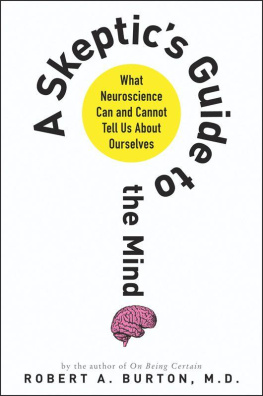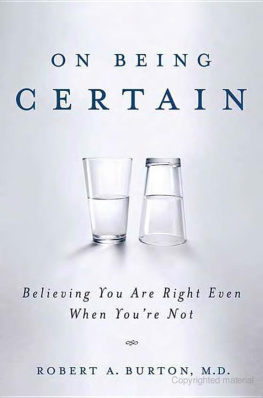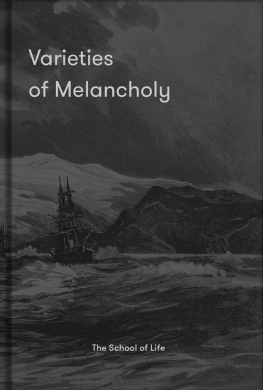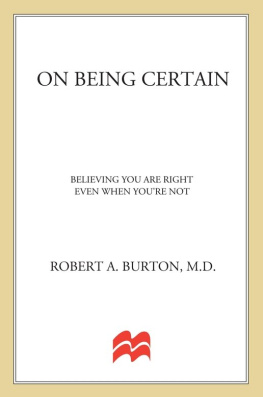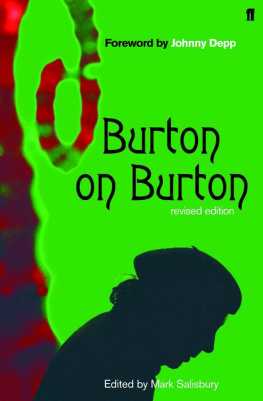Robert Burton - Anatomy of Melancholy
Here you can read online Robert Burton - Anatomy of Melancholy full text of the book (entire story) in english for free. Download pdf and epub, get meaning, cover and reviews about this ebook. year: 2021, publisher: Penguin Books Ltd, genre: Religion. Description of the work, (preface) as well as reviews are available. Best literature library LitArk.com created for fans of good reading and offers a wide selection of genres:
Romance novel
Science fiction
Adventure
Detective
Science
History
Home and family
Prose
Art
Politics
Computer
Non-fiction
Religion
Business
Children
Humor
Choose a favorite category and find really read worthwhile books. Enjoy immersion in the world of imagination, feel the emotions of the characters or learn something new for yourself, make an fascinating discovery.
- Book:Anatomy of Melancholy
- Author:
- Publisher:Penguin Books Ltd
- Genre:
- Year:2021
- Rating:4 / 5
- Favourites:Add to favourites
- Your mark:
- 80
- 1
- 2
- 3
- 4
- 5
Anatomy of Melancholy: summary, description and annotation
We offer to read an annotation, description, summary or preface (depends on what the author of the book "Anatomy of Melancholy" wrote himself). If you haven't found the necessary information about the book — write in the comments, we will try to find it.
Anatomy of Melancholy — read online for free the complete book (whole text) full work
Below is the text of the book, divided by pages. System saving the place of the last page read, allows you to conveniently read the book "Anatomy of Melancholy" online for free, without having to search again every time where you left off. Put a bookmark, and you can go to the page where you finished reading at any time.
Font size:
Interval:
Bookmark:
Edited by
ANGUS GOWLAND

PENGUIN BOOKS
UK | USA | Canada | Ireland | Australia
New Zealand | India | South Africa
Penguin Books is part of the Penguin Random House group of companies whose addresses can be found at global.penguinrandomhouse.com.

First published in 1621, revised 1624, 1628, 1632, 1638, and 1651
This edition published in Penguin Classics 2021
Editorial material copyright Angus Gowland, 2021
The moral rights of the editor have been asserted
Cover: detail from the frontispiece of The Anatomy of Melancholy, printed Oxford, 1628 British Library Board
All Rights Reserved / Bridgeman Images
Text design by Dinah Drazin
ISBN: 978-0-141-39523-4
This ebook is copyright material and must not be copied, reproduced, transferred, distributed, leased, licensed or publicly performed or used in any way except as specifically permitted in writing by the publishers, as allowed under the terms and conditions under which it was purchased or as strictly permitted by applicable copyright law. Any unauthorized distribution or use of this text may be a direct infringement of the authors and publishers rights and those responsible may be liable in law accordingly.
| 1577 | 8 February: Birth of Robert Burton in Lindley, Leicestershire. |
| 1593 | Matriculates at Brasenose College, Oxford. |
| 1597 | JuneJuly: Visits (?) the astrological physician Simon Forman in London for treatment of melancholy. |
| 1599 | Elected as a Student at Christ Church, Oxford. |
| 1602 | 30 June: Awarded the Bachelor of Arts degree. |
| 1603 | 24 March: Death of Elizabeth I and accession of James I. |
| 1605 | 9 June: Awarded the Master of Arts degree. 27 August: Performance of the pastoral comedy Alba before James I at Christ Church. |
| 1606 | Begins work on the satirical comedy Philosophaster. |
| 1609 | 12 March: Ordained as deacon. |
| 1610 | December: Elected as one of the twenty Theologi at Christ Church. |
| 1611 | 16 February: Ordained as priest. |
| 1612 | Publication of his preface to Francis Holyoakes revision of Riders Dictionary. |
| 1614 | May: Awarded the Bachelor of Divinity degree. |
| 1615 | Serves first term as Clerk of the Market at Oxford (repeated 1617, 1618). |
| 1616 | 29 November: Appointed vicar of the college benefice of St Thomas the Martyr, Osney. |
| 1618 | 16 February: First performance of Philosophaster. 23 May: The beginning of the Thirty Years War in continental Europe. 3 December: Licensed to preach. |
| 1620 | 5 December: Finishes the first edition of The Anatomy of Melancholy. |
| 1621 | Publication of the first edition of the Anatomy. |
| 1624 | 21 February: Presented to the benefice of Walesby, Lincolnshire, by the Dowager Countess of Exeter. 27 August: Appointed Librarian of Christ Church. 3 September: Granted the advowson of the rectory of Seagrave, Leicestershire, by Lord Berkeley. Publication of the second edition of the Anatomy. |
| 1625 | 27 March: Death of James I and accession of Charles I. |
| 1628 | Publication of the third edition of the Anatomy. |
| 1631 | June/July: Resigns the rectorship of Walesby. |
| 1632 | 15 June: Presented to the benefice of Seagrave. Publication of the fourth edition of the Anatomy. |
| 1638 | Publication of the fifth edition of the Anatomy. |
| 1640 | 25 January: Death of Robert Burton. |
| 1642 | 22 August: Beginning of the English Civil War. |
| 1649 | 30 January: Execution of Charles I. 19 May: Establishment of the English Commonwealth. |
| 1651 | Posthumous publication of the sixth edition of the Anatomy, with authorial additions and corrections. |
Writing about melancholy, for Robert Burton, was a personal imperative and an all-consuming endeavour. By his own account, Burton suffered from melancholy, and spent the last two decades of his life making an Antidote by reading and writing about it. The result was The Anatomy of Melancholy, almost certainly the greatest work on this subject in the history of western literature, and a book which, after its first publication in 1621, grew steadily in size in a series of revised editions, reflecting the authors ongoing quest to understand the disease and the world in which it occurred. By the time of Burtons death in 1640, the activity of writing and revising the Anatomy had become totally dominant in his literary career. A final version, with his last additions and amendments, appeared posthumously in 1651. It was his lifes work.
Burtons approach to this task was not to reduce melancholy to a single core by identifying its essential cause or symptom, or by discovering and recommending its most effective remedy, and he did not attempt to portray it with a unifying idea or overarching theme. Instead, he set about proliferating every form of recorded experience and expression of what was, for him, the most human, and therefore most multifarious, aspect of our worldly existence. When he chose to call his work an anatomy a voguish term indicating an analysis of a multifaceted object it was because he began with the recognition that investigating melancholy would mean investigating something expressed continuously throughout history, from classical antiquity to the present, in a bewildering variety of forms. This, in turn, involved identifying and describing the range of our physical and psychological dispositions, the diversity of our passions and the multiplicity of our entrenched moral, spiritual, and social pathologies, all of which, as Burton thought, contributed to our curious and fatal susceptibility to melancholy. As an anatomy, the book divides, subdivides and articulates the ways in which the multiple vagaries of human irrationality, for all their heterogeneity, share in this condition. And it orders its subject matter as effectively as such an undertaking could probably permit. As an anatomist, Burton worked to lay out the tangle of melancholic threads embedded in our nature and running through our culture and history. Once started, this would prove to be an unremitting enterprise, with each new edition showing an author bound to a task of layering in, and almost never removing, material with which to illustrate further the manifold presences and diversifications of the disease in human life.
The Anatomy of Melancholy
Font size:
Interval:
Bookmark:
Similar books «Anatomy of Melancholy»
Look at similar books to Anatomy of Melancholy. We have selected literature similar in name and meaning in the hope of providing readers with more options to find new, interesting, not yet read works.
Discussion, reviews of the book Anatomy of Melancholy and just readers' own opinions. Leave your comments, write what you think about the work, its meaning or the main characters. Specify what exactly you liked and what you didn't like, and why you think so.


